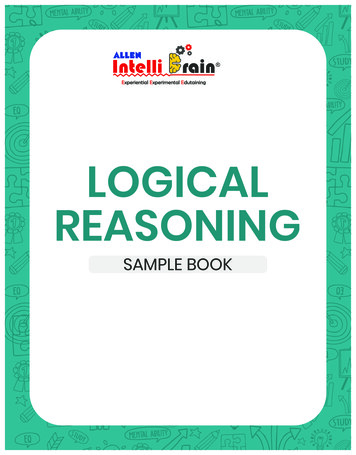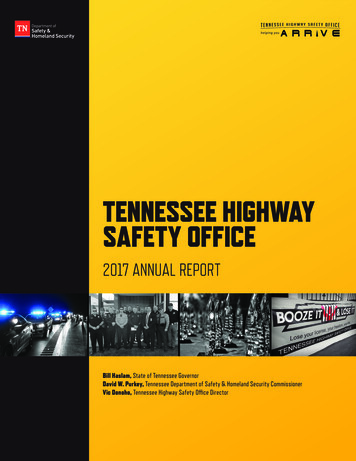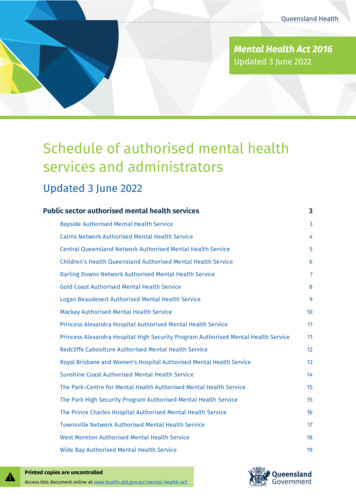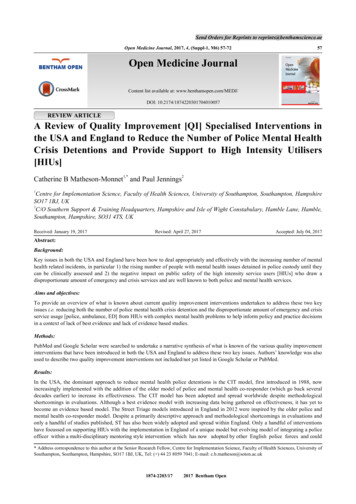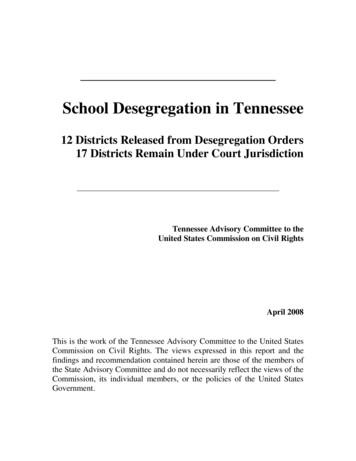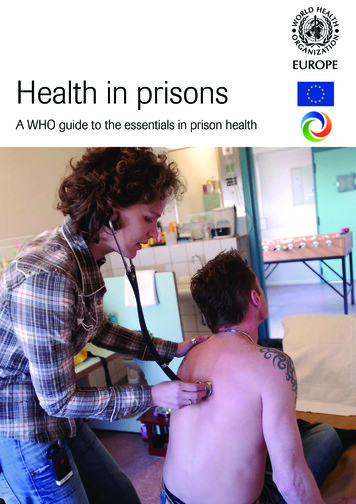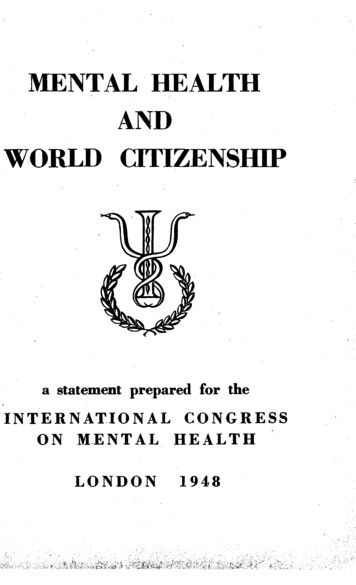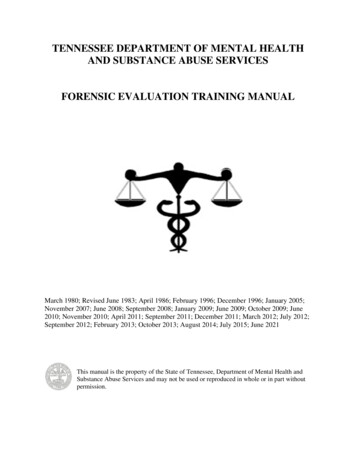
Transcription
TENNESSEE DEPARTMENT OF MENTAL HEALTHAND SUBSTANCE ABUSE SERVICESFORENSIC EVALUATION TRAINING MANUALMarch 1980; Revised June 1983; April 1986; February 1996; December 1996; January 2005;November 2007; June 2008; September 2008; January 2009; June 2009; October 2009; June2010; November 2010; April 2011; September 2011; December 2011; March 2012; July 2012;September 2012; February 2013; October 2013; August 2014; July 2015; June 2021This manual is the property of the State of Tennessee, Department of Mental Health andSubstance Abuse Services and may not be used or reproduced in whole or in part withoutpermission.
Tennessee Department of Mental Healthand Substance Abuse Servicesth5 Floor, Andrew Jackson Building500 Deaderick StreetNashville, Tennessee 37243Jeff Feix, Ph.D.Director, Office of Forensic Services(615) 532-6747Jeff.Feix@tn.govJohn Gerdes, Forensic Specialist(615) 532-6748John.Gerdes@tn.govDwan Grey, Forensic Specialist(615) 253-4159Dwan.Grey@tn.govGayle Buckler, Forensic Specialist(615) 532-6634Gayle.Buckler@tn.govDebbie Wynn, MOT Coordinator(615) 253-7309Debbie.Wynn@tn.govSherri Draper, Administrative Assistant(615) 770-1787Sherri.Draper@tn.gov
TABLE OF CONTENTSFORENSIC EVALUATION TRAINING MANUALSECTION I - INTRODUCTION TO FORENSIC EVALUATION AND THE TENNESSEEFORENSIC MENTAL HEALTH SYSTEM . 1FORENSIC TRAINING AND CERTIFICATION . 2FUNDAMENTAL CONCEPTS AND PRINCIPLES: CONDUCTING MENTALHEALTH EVALUATIONS FOR THE COURTS . 6FORENSIC SERVICES PROGRAM AT MTMHI . 7TENNESSEE JUDICIAL SYSTEM [Diagram] . 8SECTION II – PRETRIAL FORENSIC SERVICES . 9PRE-TRIAL FORENSIC STATUTES . 10COMPETENCY TO STAND TRIAL . 15INSANITY DEFENSE . 21JURY INSTRUCTIONS BEFORE JULY 1995. 26JURY INSTRUCTIONS AFTER JULY 1995 . 29INTOXICATION AND THE INSANITY DEFENSE . 30DIMINISHED CAPACITY . 32CULPABLE MENTAL STATES FOR SELECTED OFFENSES FOUND IN THECRIMINAL SENTENCING REFORM ACT OF 1989 . 37DEFENDANTS WITH INTELLECTUAL DISABILITY . 39PURPOSE STATEMENT . 41STATEMENT INFORMING DEFENDANT OF PURPOSE OF EVALUATION . 41SAMPLE - REPORT OUTLINE . 42SECTION III - FORENSIC EVALUATIONS FOR JUVENILE COURTS . 59JUVENILE COURT ORDERED EVALUATIONS UNDER T.C.A. § 37-1-128. 60TENNESSEE SUPREME COURT RULE 29 RULES OF JUVENILE PROCEDURE . 64FORENSIC EVALUATION OF JUVENILES . 66SAMPLE – REQUEST FOR INFORMATION . 69PURPOSE STATEMENT . 70STATEMENT INFORMING DEFENDANT OF PURPOSE OF EVALUATION . 70SAMPLE - JUVENILE EVALUATION REPORT OUTLINE . 71SAMPLE LETTERS TO THE JUVENILE COURT . 72SECTION IV - SPECIAL ISSUES IN FORENSIC MENTAL HEALTH EVALUATIONS . 79ii
CONFIDENTIALITY AND PRIVILEGED COMMUNICATION . 80EXPERT WITNESS TESTIMONY . 82CRIMINAL PROCESS IN TENNESSEE . 83PRE-TRIAL EVALUATION FLOW CHART . 84STAFF CONFERENCE REPORT OUTLINE - Adult Forensics . 85TENNESSEE CODE ANNOTATED TITLE 33, CHAPTER 6, PART 5 . 87SECTION V - TDMHSAS STANDARDS FOR FORENSIC SERVICES . 90OUTPATIENT ADULT FORENSIC STANDARDS . 91INPATIENT ADULT FORENSIC STANDARDS . 97OUTPATIENT JUVENILE FORENSIC STANDARDS . 107SUGGESTED READING: Forensic Evaluation Selected Bibliography . 110APPENDIX OF SELECTED FORMS . 111iii
SECTION I - INTRODUCTION TO FORENSICEVALUATION AND THE TENNESSEEFORENSIC MENTAL HEALTH SYSTEM1
FORENSIC TRAINING AND CERTIFICATIONTraining and certification is required by the Tennessee Department of Mental Health andSubstance Abuse Services (TDMHSAS) for mental health professionals employed by regionalmental health institutes or other contracted providers of inpatient services in order to providejuvenile or adult court-ordered forensic evaluations. Certified professionals are required to renewtheir certification every two years. Professional qualifications for those participating in thecertification process are described in the Rules of the Tennessee Department of Mental Health andSubstance Abuse Services (0940-3-3-.01 through 0940-3-3-.03).Requirements for Forensic CertificationThe following information is an extract from the Tennessee Department of Mental Healthand Substance Abuse Services, Mental Health Services Division, Chapter 0940-3-3-Forensics.0940-03-03-.01 Scope(1)These rules specify certification criteria for forensic evaluators who are employeesof the Department of Mental Health and Developmental Disabilities (TDMHDD); or,who are under contract with TDMHDD through an agency or as a privatepractitioner.Authority: T.C.A. §§ 4-4-103; 33-1-201; 33-1-202; 33-1-203; 33-1-204; 33-1-302; 33-1-305; andTitle 33, Chapter 7.0940-03-03-.02 Forensic Certification.(1)Forensic evaluator certification is awarded at the discretion of TDMHDD to aprofessional who meets education and licensure requirements and who satisfactorilycompletes forensic training offered by TDMHDD.(2)Forensic evaluator certification is valid for two full fiscal years and shall berenewed by attending a TDMHDD forensic recertification training session. Aforensic training session approved by TDMHDD may be substituted for therecertification training.Authority: T.C.A. §§ 4-4-103; 33-1-201; 33-1-202; 33-1-203; 33-1-204; 33-1-302; 33-1-305; andTitle 33, Chapter 7.0940-03-03-.03 Evaluation of and Expert Testimony on Competence to Stand Trial under T.C.A.Title 33, Chapter 7, Part 3.(1) Persons performing mental health evaluations and/or providing expert witness testimonyto determine competence to stand trial under T.C.A. Title 33, Chapter 7, Part 3 shall:2
(a)(b)(c)(2)Meet the qualification requirements specified in Rule 0940-03-03-.03(2)(a)(h);Be certified as a forensic evaluator as described in Rule 0940-03-03-.02; andParticipate in the assessment of the defendant.A person with any of the following qualifications may seek certification to determinecompetence to stand trial:(a)A physician licensed in the State of Tennessee with expertise in psychiatry asdetermined by training, education, or experience;(b)A psychologist licensed in Tennessee with health service providerdesignation;(c)A psychological examiner licensed in Tennessee with health service providerdesignation;(d)A master’s social worker licensed in Tennessee under the supervision of aclinical social worker licensed in Tennessee;(e)A clinical social worker licensed in Tennessee;(f)A nurse clinical specialist licensed to practice nursing in Tennessee who hasearned a master’s degree in psychiatric nursing;(g)A professional counselor licensed in Tennessee;(h)A person who has received a master’s degree or its equivalent, in a humanservice or behavioral science related field, and who has completed at leastone year of practical forensic experience under the supervision of a certifiedforensic evaluator subject to review and approval by the Director of theOffice of Forensic Services of TDMHDD.(3)A licensed physician with expertise in psychiatry as determined by training,education, or experience shall participate in the evaluation of and/or provide expertwitness testimony about a person charged with first degree murder, as defined byT.C.A. § 39-13-202.(4)All notices of recommendations to the court for an inpatient evaluation under T.C.A.§ 33-7-301(a) shall be signed by either a physician licensed in the State of Tennesseewith expertise in psychiatry as determined by training, education, or experience or apsychologist licensed in Tennessee with health service provider designation. Thephysician or psychologist signing the notice of recommendations to the court shallhave participated in the assessment of the defendant.Authority: T.C.A. §§ 4-4-103; 33-1-201; 33-1-202; 33-1-203; 33-1-204; 33-1-302; 33-1-305; andTitle 33, Chapter 7.3
0940-03-03-.04 Evaluation of and Expert Testimony on Mental Condition at the Time of theOffense under T.C.A. Title 33, Chapter 7, Part 3.(1) Persons performing mental health evaluations and/or providing expert witness testimonyregarding mental condition at the time of the offense under T.C.A. Title 33, Chapter 7,Part 3 shall:(a)(b)(c)(2)(3)Meet the qualification requirements specified in Rule 0940-03-03-.04(2);Be certified as a forensic evaluator as described in Rule 0940-03-03-.02; andParticipate in the assessment of the defendant.Mental health evaluations and expert testimony regarding mental condition at thetime of the offense may be provided only by persons who meet the followingminimum qualifications:(a)A physician licensed in the State of Tennessee with expertise in psychiatry asdetermined by training, education, or experience; or(b)A psychologist licensed in Tennessee with health service providerdesignation.A licensed physician with expertise in psychiatry as determined by training,education, or experience shall participate in the evaluation of and/or provide expertwitness testimony about a person charged with first degree murder, as defined byT.C.A. § 39-13-202.Authority: T.C.A. §§ 4-4-103; 33-1-201; 33-1-202; 33-1-203; 33-1-204; 33-1-302; 33-1-305; andTitle 33, Chapter 7.Training for CertificationEligible mental health professionals are required to attend an initial certification trainingsession by TDMHSAS’ Division of Planning, Research & Forensics. Participation in the entiresession is necessary for forensic certification. Initial forensic certification training is scheduled noless than once each fiscal year (there are typically three sessions).Topics covered during training include:(1) an historical perspective of Forensic Services (including the evolution of the TDMHSAS’present role in this area);(2) an explanation of the training and certification process;(3) the process for assessing competency to stand trial and mental condition at time of the crime;(4) an overview of the criminal and juvenile justice system;(5) a discussion of forensic law and rules of the Department of Mental Health and SubstanceAbuse Services; and(6) expert witness testimony.4
Further discussion will focus on more sophisticated and less clear-cut problems in theevaluation process such as forensic evaluator requests for intellectual disability evaluations;substance abuse assessment, diagnosis and treatment options; and the use of psychotropicmedications. Also, videotaped recordings are used to assist in the training process. Participantsmust successfully complete a study guide for forensic evaluator certification.Renewal of CertificationCertification to perform forensic evaluations is valid for two (fiscal) years. Certification toperform forensic evaluations must be renewed by participation in the forensic renewal trainingprogram sponsored by TDMHSAS’ Office of Planning, Research & Forensics and continuedparticipation in the performance of forensic evaluations. Notification of the forensic renewaltraining is made to the forensic coordinator at each facility or agency as sessions are scheduled. Onan annual basis, the calendar for initial forensic evaluator training is sent to the forensiccoordinators for use in advance planning for forensic staff training.Certification expires at the end of the second fiscal year following the fiscal year of initialcertification or renewal. For example, certification of an individual certified between July 1, 2014and June 30, 2015 will expire on June 30, 2017. If an evaluator allows certification to expire, theTDMHSAS will no longer recognize that individual as eligible to be designated by theCommissioner to perform court-ordered evaluations. The evaluator is required to participate ininitial forensic training in order to become certified to perform forensic evaluations again.Certification of evaluators is also a mechanism to ensure the courts that evaluations are ofhigh quality and performed consistently statewide.Institute Ward Staff TrainingWard staffs are not eligible for certification to perform competency evaluations nor are theyrequired to receive special training in the area of forensics. However, since these individuals areinvolved in the ongoing observation, treatment, and care of forensic clients, TDMHSAS’ Divisionof Planning, Research & Forensics does offer basic forensic training if requested to do so by theinpatient facility. The training program is designed to expose the staff to forensic issues relevant totheir specific job responsibilities and to the importance of the work they perform.5
FUNDAMENTAL CONCEPTS AND PRINCIPLES: CONDUCTING MENTALHEALTH EVALUATIONS FOR THE COURTSSo, you want to be a forensic evaluator . . . . The Expert Consultation Model: The evaluator is considered to have specialized knowledgewhich could assist the trier of fact; the evaluator’s opinion is on mental health issues, not theoutcome of the judicial proceeding. The Importance of Professional Relationships: You are not the subject’s therapist. It iscrucial to make the distinction between treating professionals and yourself as an evaluator, adistinction important for the subject and for you. Your client is the Court, not the defendant.This is different from “informed consent;” the defendant should be informed but does nothave to consent or even have the capacity to consent. The Statement of Purpose documentsthat the defendant was informed and is included in the record for all evaluations. The Importance of Professional Role: The forensic evaluator has a strictly defined role. Thescope of the evaluation is defined by the court order. The evaluator addresses only thoseissues, does not conduct evaluations on issues or populations outside his/her area ofexpertise and approaches all evaluations from an impartial stance. While your opinion isultimately your own, you do represent the TDMHSAS in all presentations to the courts. Forensic Evaluation as Investigation: The conclusions in a forensic evaluation are based ondata which is described earlier in the evaluation; all conclusions can be traced to the data inthe evaluation. Multiple sources of data are necessary (e.g. subject’s report, previoustreatment records, victim/witness/police accounts, criminal history) with collateral sourcesof information being crucial. When introducing the defendant’s self-report, you mustaddress the response style (Faking good? Faking bad?) which itself must be assessed withmultiple sources of information (e.g. testing, collateral accounts). Basics of Communicating with the Court: Remember your audience is not mental healthprofessionals; avoid jargon and draw clear lines from the data you collected to yourconclusions. Cite your sources of information in your report. Do not offer an opinion on theultimate legal question. You may speak to attorneys with follow-up questions about yourevaluation, but include both sides and do not release additional records without a courtorder.See also:Heilbrun, K. (2001). Principles of forensic mental health assessment. New York: KluwerAcademic/Plenum Publishers.Melton, G. B., Petrila, J., Poythress, N. G., & Slobogin, C. (2007). Psychological evaluations for thecourts: A handbook for mental health professionals and lawyers (3rd ed.). New York:Guilford Press.6
DESCRIPTION OF FORENSIC MENTAL HEALTH SERVICES IN TENNESSEETDMHSAS defines forensic mental health services to include: T.C.A.§ 33-7-301(a) pre-trial evaluation of any adult defendant, whether mentally ill orintellectually disabled, for competency to stand trial and/or for mental condition at thetime of the alleged crime, T.C.A.§ 33-7-301(b) treatment of defendants found incompetent to stand trial andcommittable because of mental illness or treatment of defendants who are foundcompetent, but committable, Title 33, Chapter 7, Part 4 Mandatory Outpatient Treatment of incompetent defendantswho do not meet commitment criteria under T.C.A. § 33-7-301(b), T.C.A.§ 33-7-303(a) evaluation of committability of persons who are found not guiltyby reason of insanity, T.C.A.§ 33-7-303(c) treatment of those persons found committable to an inpatientfacility after having been found not guilty by reason of insanity treatment of persons who are committed to the Department of Correction and whocannot receive appropriate treatment within the Department of Correction, treatment of civilly committed adult patients who have been transferred by theTDMHSAS Commissioner to FSP, for maximum security, from a regional mentalhealth institute (RMHI) after a determination that the individual is mentally ill andsubstantially likely to injure himself or others if not treated in a secure unit; and T.C.A.§ 37-1-128, evaluation of juvenile defendants in the areas of competency tostand trial, mental condition at the time of the alleged crime, diagnosis and treatmentneeds and/or recommendations for specific services.FORENSIC SERVICES PROGRAM AT MTMHIThe Forensic Services Program (FSP), located on the grounds of MTMHI, is the onlyfacility in Tennessee designated as a maximum security facility of the TDMHSAS which providespre-trial evaluations and treats those defendants who are diagnosed with a mental illness, who arejudicially committed, and whose behavior requires maximum security. Although this unit is part ofthe MTMHI campus, it is a free-standing unit that provides services to the entire state. Admissionto this unit is dictated by statute or authorization by the Commissioner for transfer.There are only three methods by which individuals may be admitted to FSP. These include:court orders from courts with criminal jurisdiction as defined in Title 33, Chapter 7; or authorizationby the Commissioner of TDMHSAS for transfers from RMHIs; or transfers from the Department ofCorrection (DOC) authorized through the proper procedures as defined by law.Placement in FSP’s maximum security unit or in an RMHI is based on the defendant'sbehavior, treatment needs and escape risk. Patients who do not require the maximum security arereferred to the RMHI even if charged with a violent felony. Defendants requiring maximumsecurity, regardless of their charges, are referred to FSP. It is the responsibility of the referringcommunity mental health center to recommend the level of security needed by those they evaluate,under T.C.A. § 33-7-301(a), in their letters to the court.7
TENNESSEE JUDICIAL SYSTEM [DIAGRAM]SOURCE: 2005-2006 Annual Report of the Tennessee Judiciary8
SECTION II – PRETRIAL FORENSIC SERVICES9
PRE-TRIAL FORENSIC STATUTESNOTE: Sample court orders for forensic evaluation and treatment services available at theDepartment's website. Go to: Tennessee.gov/Mental, click Sitemap, click Forensic andJuvenile Court (under Division of Planning, Research & Forensics), click FormsPlease note that the following text is verbatim and in the exact format of Title 33.33-7-301. Evaluation of accused believed incompetent to stand trial — Judicial hospitalizationproceedings — Recovery report. —(a) (1) When a defendant charged with a criminal offense is believed to be incompetent tostand trial, or there is a question about the defendant's mental capacity at the time of the commissionof the crime, the criminal, circuit, or general sessions court judge may, upon the judge's own motionor upon petition by the district attorney general or by the attorney for the defendant and afterhearing, order the defendant to be evaluated on an outpatient basis. The evaluation shall be done bythe community mental health center or licensed private practitioner designated by the commissionerto serve the court or, if the evaluation cannot be made by the center or the private practitioner, on anoutpatient basis by the state hospital or the state-supported hospital designated by the commissionerto serve the court. If, and only if, the outpatient evaluator concludes that further evaluation andtreatment are needed, the court may order the defendant hospitalized, and if in a department facility,in the custody of the commissioner for not more than thirty (30) days for further evaluation andtreatment for competence to stand trial subject to the availability of suitable accommodations.(2) At any stage of a felony criminal proceeding, including a pre-trial hearing, trial,sentencing, or post-conviction proceeding, the state may move or petition the court to authorize thedistrict attorney general to designate a qualified expert to examine the defendant if the defendantgives notice that the defendant intends to offer testimony about the defendant's mental condition,whether in support of a defense of insanity or for any other purpose. The court may authorize thedistrict attorney general to designate a qualified expert, who is willing to be appointed, to examinethe defendant, if:(A) An inpatient evaluator under subdivision (a)(1) notifies the court in a pre-trialproceeding that the type or extent of assessment required exceeds the expertise or resources availableto the evaluator or exceeds the scope of analysis of the defendant's competence to stand trial,satisfaction of criteria for the insanity defense, or for commitment under chapter 6, part 5, of thistitle; or(B) In any other type of felony criminal proceeding, the court determines that examination ofthe defendant by a qualified expert for the state is necessary to adjudicate fairly the matter before it.(3) The amount and payment of expert fees shall be determined and paid by the state districtattorneys general conference.(4) (A) Except as provided in subdivision (a)(4)(B), during the post-conviction stage of acriminal proceeding, if it is believed that a defendant is incompetent to assist counsel in preparation10
for, or otherwise participate in, the post-conviction proceeding, the court may, upon its own motion,order that the defendant be evaluated on either an outpatient or inpatient basis, as may beappropriate. If the defendant is indigent, the amount and payment of the costs for the evaluation shallbe determined and paid for by the administrative office of the courts. If the defendant is not indigent,the cost of the evaluation shall be charged as court costs. If the evaluation cannot be done on anoutpatient basis and if it is necessary to hospitalize the defendant in a department facility,hospitalization shall not be for more than thirty (30) days and shall be subject to available suitableaccommodations. Prior to transporting a defendant for such evaluation and treatment in a departmentfacility, the sheriff or other transportation agent shall determine that the receiving department facilityhas available suitable accommodations. Any costs incurred by the administrative office of the courtsshall be absorbed within the current appropriation for the indigent defense fund.(B) In a post-conviction proceeding in a capital case, if there is a question on the defendant'smental condition at the time of the commission of the crime when there has been no such priorevaluation or a question as to whether the defendant is intellectually disabled, the court may, upon itsown motion or upon petition by the district attorney general or by the attorney for the defendant,and, if the matter is contested, after a hearing, order that the defendant be evaluated on an outpatientbasis. If and only if the outpatient evaluator concludes that an inpatient evaluation is necessary, thecourt may order the defendant to be hospitalized for not more than thirty (30) days.(5) Prior to transporting a defendant for such evaluation and treatment in a departmentfacility, the sheriff or other transportation agent shall determine that the receiving department facilityhas available suitable accommodations.(b) (1) If the court determines on the basis of the mental health evaluation and other relevantevidence:(A) That the defendant is incompetent to stand trial because of mental illness; or(B) (i) That the defendant is competent to stand trial but that the failure to hospitalize wouldcreate a likelihood to cause the defendant serious harm by reason of mental illness; and(ii) The defense attorney agrees with those findings, the district attorney general or theattorney for the defense may petition the criminal court before which the case is pending or thatwould hear the case, if the defendant were bound over to the grand jury to conduct proceedings forjudicial hospitalization under chapter 6, part 5, of this title.(2) Either party may demand a jury trial on the issues.(3) The court is vested with jurisdiction to conduct the proceedings.(4) In the proceedings the court shall determine, in addition to the findings required bychapter 6, part 5 of this title, whether the defendant is substantially likely to injure the defendant orothers if the defendant is not treated in a forensic services unit and whether treatment is in thedefendant's best interest.11
(5) If the court enters an order of judicial hospitalization, the defendant shall be transferredto the custody of the commissioner, and if the court finds in addition that the defendant issubstantially likely to injure the defendant or others if the defendant is not treated in a forensicservices unit and that treatment in the unit is in the defendant's best interests, the defendant shall betransferred to the custody of the commissioner at a forensic services unit designated by thecommissioner. If the court commits a person under this subsection (b), the person comes into thecommissioner's custody only if the forensic services unit has available suitable accommodations;provided, that, if there are no suitable available accommodations at the time of the determination,then the commissioner shall expeditiously find a state-owned or operated hospital or treatmentresource to accommodate the person upon the availability of suitable available accommodations.Prior to transporting a defendant for such commitment, the sheriff or other transportation agent shalldetermine that the receiving facility has available suitable accommodations.(c) When a defendant admitted under subsection (b) has been hospitalized for six (6) months, and atsix-month intervals thereafter, the chief officer of the hospital shall file a written report with theclerk of the court by whose order the defendant was confined and shall give a copy of the report tothe defendant, the defendant's attorney, the defendant's legal guardian or conservator, if any, and tothe district attorney general. The chief officer shall also send a copy of the report to the defendant'sparent, adult child, or spouse, whichever is appropriate, but at least one (1) of the three (3). Thereport shall detail the chief officer's best judgment as to the defendant's prospects for recovery, thedefendant's present condition, the time required for relevant kinds of recovery, and whether there issubstantial probability that the defendant will become competent to stand trial in the foreseeablefuture. This reporting obligation shall cease at the point that misdemeanor charges are retired fordefendants with no other charges in accordance with subsection (d).(d) If a defendant is found to be incompetent to stand trial, any misdemeanor charges pending at thetime of the incompetency determination shall be retired no later than eleven (11) months and twentynine (29) days after the date of arrest when the misdemeanor charge or charges have not otherwisebeen disposed of except that no misdemeanor charges shall be retired pursuant to this subsection (d)if the defendant is restored to competency prior to the date on which the misdemeanor charge orcharges would have otherwise been retired under this subsection (d).HISTORY: Acts 1974, ch. 464, § 1; 1975, ch. 248, § 26; 1977, ch. 386, § 1; 1982, ch. 862, § 12;T.C.A., § 33-708; Acts 1985, ch. 437, § 26; 1987, ch. 143, § 4; 1998, ch. 978, §§ 1, 2; 2000, ch. 947,§ 1; 2002, ch. 730, § 51; 2005, ch. 260, § 1; 2009, ch. 419, § 1; 2009, ch. 531, §§ 44, 46, 47; 2010,ch. 734, § 1; 2013, ch. 100, §§ 1, 2.33-7-302. Determination and notice of restored competence to stand trial. —When the chief officer determines that a defendant in a state hospital or treatment resource who ischarged with a crime is restored to competence to stand trial, the chief officer shall give notice oftha
Substance Abuse Services (TDMHSAS) for mental health professionals employed by regional mental health institutes or other contracted providers of inpatient services in order to provide juvenile or adult court-ordered forensic evaluations. Certified professionals are required to renew their certification every two years.

